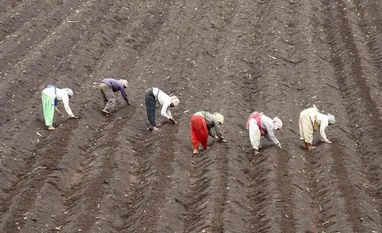30% of India's soil degraded, urgent action needed: Agri Minister Chouhan
Agriculture minister Shivraj Singh Chouhan stressed on the pivotal role of soil health in achieving sustainable development goals (SDGs) such as zero hunger, climate action, and life on land
)
(Photo: PTI)
Listen to This Article
Minister of Agriculture and Farmers' Welfare Shivraj Singh Chouhan on Tuesday raised alarm over soil degradation, which now affects 30 per cent of the country’s land, calling for immediate measures to safeguard soil quality for sustainable agriculture.
Speaking at a global conference on soil through video conferencing, Chouhan said that soil health plays a pivotal role in achieving sustainable development goals (SDGs) such as zero hunger, climate action, and life on land.
“India produces over 330 million tonnes of foodgrains annually and exports agricultural products worth $50 billion. While this is commendable, it is imperative to address the pressing concerns surrounding soil health,” Chouhan said.
Degradation threatens agri productivity
Highlighting the root causes, Chouhan noted that 30 per cent of India's soil is degraded due to factors such as excessive fertiliser use, imbalance in nutrient application, unsustainable exploitation of natural resources, and poor soil management practices.
The minister pointed to several government interventions aimed at mitigating this crisis. These include the distribution of over 220 million soil health cards, which provide farmers with information on soil nutrient status, and the promotion of practices like micro-irrigation, organic farming, and natural cultivation methods.
Also Read
However, Chouhan stressed that these initiatives need to be scaled up, particularly in light of challenges posed by rising global temperatures, erratic rainfall, and the broader impact of climate change.
He also announced the forthcoming launch of a modern agriculture programme designed to bridge the gap between scientific research and farming practices.
Limited use of soil conservation practices
At the same event, Niti Aayog member Ramesh Chand drew attention to the limited adoption of conservation agriculture and zero tillage in India and South Asia, despite the successful implementation of these practices in countries like Brazil and Argentina.
Conservation agriculture involves practices that improve soil health, such as minimal soil disturbance and crop rotation, while zero tillage eliminates the need for traditional ploughing to preserve soil structure.
Chand called on the Indian Soil Scientists Society (ISSS), whose president was also in attendance, to lead efforts in advancing regenerative agriculture and natural farming practices, which are currently being championed only on a small scale by select NGOs and private organisations.
The conference was also attended by ICAR Director General Himanshu Pathak and Trilochan Mohapatra, chairperson of the Protection of Plant Varieties and Farmers' Rights Authority.
(With inputs from PTI)
More From This Section
Topics : Soil health Ministry Of Agriculture agriculture economy agriculture in India agriculture growth BS Web Reports
Don't miss the most important news and views of the day. Get them on our Telegram channel
First Published: Nov 19 2024 | 3:01 PM IST